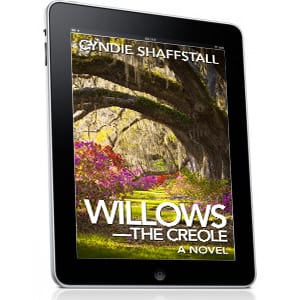As much as it shouldn’t be, history is subjective. People remember events differently and when those events are chronicled, the differences become more obvious. The historical events in this book are therefore, true—at least they have been chronicled as such. The narrator, the plantation, and her family who worked there, are all fiction. I simply used these people as a vehicle for retelling an important part of history—the pursuit of suffrage in the United States.

When I began writing Willows, I thought I had a fairly accurate knowledge of the history of suffrage, both for blacks and for women, but I was wrong. I did not know that Susan B. Anthony fought tirelessly for black rights, or that Belva Lockwood made it onto the presidential ballot in 1884, or that Louisiana legally recognized mixed-race marriages as early as the 1600s. These, of course, are big differences, but I learned about a lot of little things, too: the overall sentiment of the times; how today’s political parties have changed since then; and of scandals, not unlike those which plague our current politicians.
I found it all completely fascinating.
I hope you learn something from my book, and that it reminds you how far we’ve come, and how far we’ve yet to go.
.
